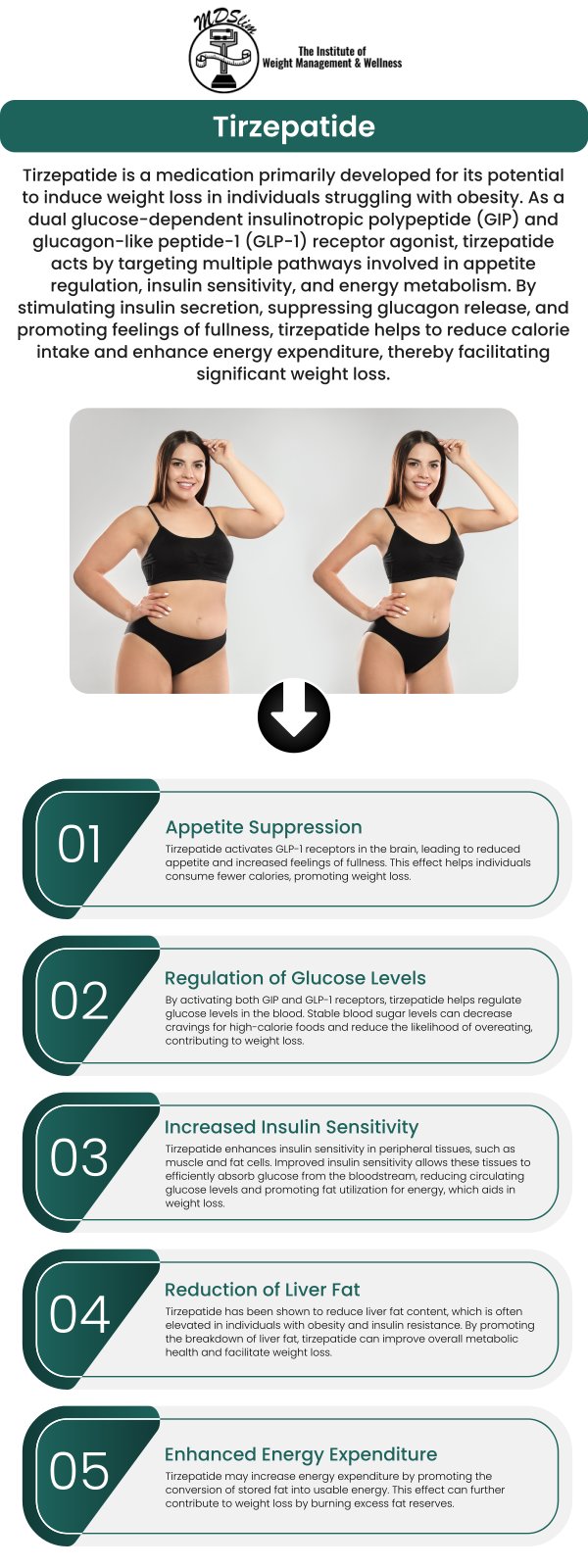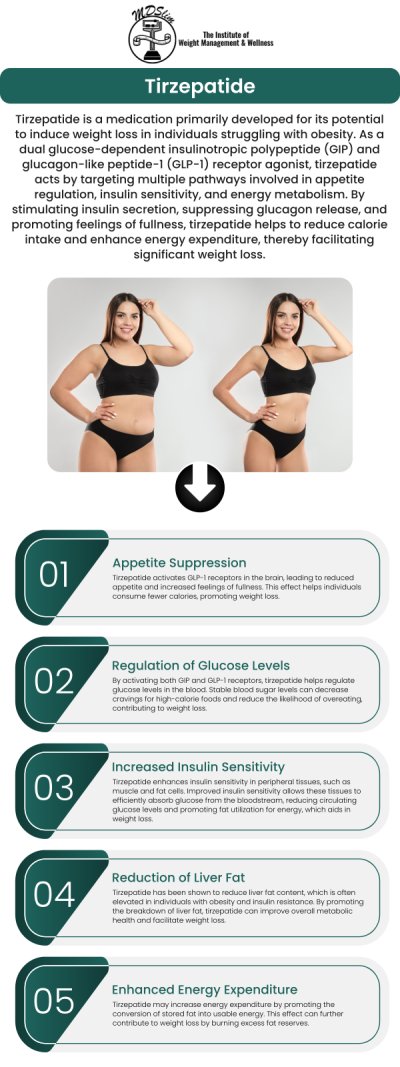Tirzepatide Injections for Medical Weight Loss in Hackensack, NJ
Tirzepatide injections are an effective solution for weight loss, offering a proven approach to managing hunger and improving insulin sensitivity. At the Institute for Weight Management, Dr. Anjana Chhabra provides personalized treatment plans that incorporate Tirzepatide as part of a holistic weight loss strategy. Tirzepatide helps control appetite, leading to reduced calorie intake and sustainable weight loss when combined with healthy lifestyle changes like diet and exercise. Contact us today or book an appointment online for personalized care that works for you. Conveniently located at 150 Overlook Ave, Hackensack, NJ 07601.




Table of Contents:
What is Tirzepatide and how does it work for weight loss?
How long will I need to use Tirzepatide for weight loss?
How often are Tirzepatide injections given for weight loss?
What results can I expect from Tirzepatide for weight loss?
How can Tirzepatide injections aid in medical weight loss when guided by Dr. Anjana Chhabra?
Tirzepatide is a novel medication that has been developed for the treatment of type 2 diabetes and has shown promising results for weight loss. At The Institute for Weight Management, we use Tirzepatide as part of a medically supervised weight loss program. Tirzepatide is a dual GLP-1 and GIP (glucose-dependent insulinotropic polypeptide) receptor agonist. It works by mimicking the effects of natural hormones in the body that regulate blood sugar, insulin sensitivity, and appetite.
The medication helps to reduce food intake by enhancing feelings of fullness and satisfaction after meals. By slowing down the emptying of the stomach, Tirzepatide extends the sensation of satiety, which makes it easier to reduce calorie intake without feeling deprived or excessively hungry. It also improves the body’s ability to regulate blood sugar, which is especially beneficial for those who are overweight or obese and have insulin resistance.
At The Institute for Weight Management, Tirzepatide is prescribed alongside a comprehensive weight loss plan that includes healthy eating habits and physical activity. This holistic approach maximizes the medication’s effects while supporting long-term weight management. The combination of appetite suppression and improved insulin function helps individuals achieve meaningful weight loss, improve overall health, and reduce the risk of developing conditions like type 2 diabetes. Regular follow-ups with our team ensure the medication is working as expected, and adjustments are made based on your progress.
The duration of Tirzepatide use for weight loss can vary depending on individual goals, health status, and how well the medication works for you. At The Institute for Weight Management, we guide patients through their weight loss journey with a focus on achieving sustainable results. Typically, patients will use Tirzepatide for several months as part of a long-term weight management strategy.
The treatment usually starts with a gradual dose increase to minimize side effects such as nausea and gastrointestinal discomfort. Over time, patients may continue using Tirzepatide for up to a year or longer, depending on how well they are responding to the medication and whether they have achieved their desired weight loss. The goal is to help individuals lose weight in a safe and sustainable manner, and Tirzepatide plays a critical role in this process by suppressing appetite and improving insulin sensitivity.
While Tirzepatide can be a long-term treatment for weight loss, it is essential to incorporate other lifestyle changes, such as adopting a healthy diet and regular exercise routine, to ensure lasting success. In some cases, when a patient reaches their weight loss goal and is able to maintain it through lifestyle modifications, they may be able to reduce or discontinue the medication under medical supervision. Regular check-ins with the team at The Institute for Weight Management ensure that you are on track and that your treatment plan remains aligned with your health objectives.
Tirzepatide injections are typically administered once a week for weight loss, making it a convenient treatment option for those seeking a sustainable solution to manage their weight. At The Institute for Weight Management, we provide clear instructions on how to self-administer the weekly injection, which is done through a subcutaneous (under the skin) injection. These injections are easy to incorporate into your weekly routine, allowing for consistent treatment without the need for daily administration.
The treatment begins with a low dose of Tirzepatide, and the dose is gradually increased over time to reduce potential side effects, such as nausea. As the dose increases, the medication becomes more effective at controlling appetite and promoting weight loss. Our team at The Institute for Weight Management ensures that you are guided through each step of the process, helping you adjust to the medication and making any necessary adjustments based on your progress and response to treatment.
Injections are typically administered in the thigh, abdomen, or upper arm, and our team is available to assist with any questions or concerns you may have about the injection process. Regular follow-up appointments help us monitor your progress, track weight loss results, and ensure that the treatment continues to meet your needs.
The results from Tirzepatide for weight loss vary depending on individual factors such as starting weight, lifestyle habits, and adherence to the prescribed plan. However, clinical studies have shown that Tirzepatide can help individuals lose a significant amount of weight, often ranging from 10% to 15% of their total body weight over a year of treatment. At The Institute for Weight Management, we aim to tailor treatment plans to each patient’s unique needs and health goals, ensuring that Tirzepatide is used effectively to maximize results.
Patients typically begin to notice weight loss within the first few weeks of starting Tirzepatide, as the medication suppresses appetite and promotes feelings of fullness after meals. This results in a reduced calorie intake and a more manageable approach to weight loss. The full benefits of Tirzepatide may take a few months to become evident, as the medication works gradually to suppress hunger and improve insulin sensitivity.
In addition to weight loss, many patients experience other health benefits, such as improved blood sugar control, reduced risk of type 2 diabetes, and better overall metabolic health. Tirzepatide also supports the preservation of lean muscle mass while promoting fat loss, which helps maintain a healthy body composition.
At The Institute for Weight Management, we monitor your progress regularly to ensure that Tirzepatide is working effectively. We adjust your treatment plan as needed, incorporating lifestyle changes such as a balanced diet and exercise, to ensure that you continue to see positive results over time.
Tirzepatide injections are an advanced treatment for medical weight loss, offering a promising solution for individuals struggling to lose weight. Under the guidance of Dr. Anjana Chhabra at The Institute for Weight Management, Tirzepatide works by targeting multiple pathways in the body that regulate appetite and glucose metabolism. Acting on both GLP-1 and GIP receptors, it helps reduce hunger, improve insulin sensitivity, and promote feelings of fullness, making it easier to consume fewer calories.
When used as part of a comprehensive weight loss plan, including a healthy diet and regular physical activity, Tirzepatide can support steady and sustainable weight loss. It helps patients curb their cravings and control portions, which is often a significant challenge in the weight loss journey.
Dr. Chhabra personalizes Tirzepatide treatment to meet each patient’s specific needs, ensuring the medication is tailored to help them achieve their weight loss goals. At The Institute for Weight Management, ongoing monitoring and support from Dr. Chhabra and her team ensure that the treatment is effective and safe, helping patients achieve a healthier weight and overall well-being. Contact us today or book an appointment online for personalized care that works for you. Conveniently located at 150 Overlook Ave, Hackensack, NJ 07601, we proudly serve clients from Ridgewood, Tenafly, Glen Rock, Paramus, Oradell, River Edge, Upper Saddle River, Wyckoff, and surrounding areas.









